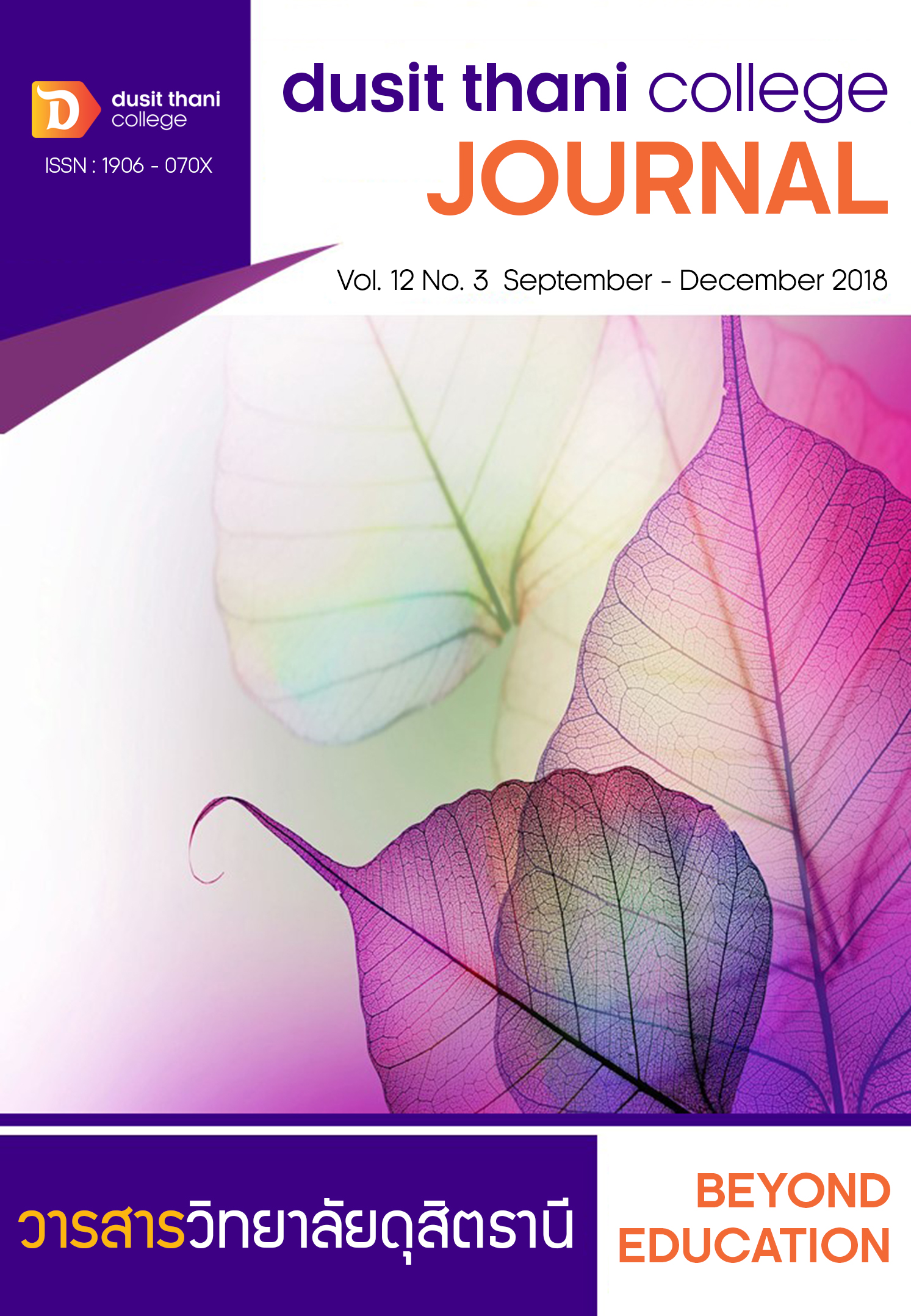แรงจูงใจในการลงทุนของผู้ประกอบการโรงแรมบูติกในเขตอำเภอหัวหิน - ชะอำ
Main Article Content
บทคัดย่อ
งานวิจัยมีวัตถุประสงค์เพื่อศึกษาแรงจูงใจทางด้านการกระทำทางสังคม ด้านความต้องการจากการเรียนรู้ ลักษณะความต้องการในการลงทุนและศึกษาแนวโน้มผลตอบแทนจากการลงทุนในการประกอบธุรกิจที่พักประเภทโรงแรมบูติกในเขตอำเภอหัวหิน - ชะอำ กลุ่มตัวอย่างเป็นผู้ประกอบการที่พักประเภทโรงแรมบูติกในเขตอำเภอหัวหิน - ชะอำ โดยเป็นแบบผสมผสานและแบบสมัยใหม่ แบบละ 3 ท่าน รวมจำนวน 6 ท่าน ใช้การเก็บข้อมูล 2 ระดับ คือ (1) แบบสอบถาม ด้วยวิธีการเลือกเฉพาะเจาะจง ดำเนินการเก็บข้อมูลด้วยเทคนิคเดลฟาย จำนวน 3 ครั้ง โดยใช้สถิติในการวิเคราะห์ข้อมูลได้แก่ ค่ามัธยฐานและค่าพิสัยระหว่างควอไทล์ (2) แบบสัมภาษณ์ ใช้วิธีการวิเคราะห์เนื้อหาเป็นกรอบตีความสรุปไปสู่การวิเคราะห์การสัมภาษณ์เจาะลึก
ผลการศึกษาพบว่า ผู้ประกอบการส่วนใหญ่เกิดแรงจูงใจด้านกระทำทางสังคมด้านปัจจัยจูงใจมากที่สุด คือ การเห็นโอกาสทางธุรกิจจากการเปลี่ยนแปลงพฤติกรรมของนักท่องเที่ยวที่ชอบแสดงออกถึงรูปแบบการดำเนินชีวิตของตัวเอง ส่วนด้านความต้องการเรียนรู้มากที่สุด คือ มีการวางแผน เป้าหมายสูง กล้าเสี่ยงและชอบการแข่งขัน อีกทั้งได้รับผลตอบแทนจากการลงทุนที่ดี ซึ่งจากตัวชี้วัดผลการดำเนินงานยังพบว่าโรงแรมบูติกแบบผสมผสานสามารถสร้างมูลค่าเพิ่มสูงสุดให้กับโครงการ
Article Details
นโยบายการพิจารณากลั่นกรองบทความ
- บทความวิจัยและบทความวิชาการทุกเรื่องที่จะได้รับการตีพิมพ์ต้องผ่านการพิจารณากลั่นกรองโดยผู้ทรงคุณวุฒิ (Peer Review) ในสาขาที่เกี่ยวข้อง จำนวน 3 ท่าน/บทความ
- บทความ ข้อความ ภาพประกอบและตารางประกอบที่ลงตีพิมพ์ในวารสารเป็นความคิดเห็นส่วนตัวของผู้เขียน กองบรรณาธิการไม่จำเป็นต้องเห็นด้วยเสมอไป และไม่มีส่วนรับผิดชอบใด ๆ ถือเป็นความรับผิดชอบของผู้เขียนแต่เพียงผู้เดียว
- บทความที่จะได้รับการตีพิมพ์จะต้องไม่เคยตีพิมพ์ เผยแพร่ที่ใดมาก่อน และไม่อยู่ระหว่างการพิจารณาของวารสารฉบับอื่น หากตรวจสอบพบว่ามีการตีพิมพ์ซ้ำซ้อน ถือเป็นความรับผิดชอบของผู้เขียนแต่เพียงผู้เดียว
- บทความใดที่ผู้อ่านเห็นว่าได้มีการลอกเลียนหรือแอบอ้างโดยปราศจากการอ้างอิง หรือทำให้เข้าใจผิดว่าเป็นผลงานของผู้เขียน กรุณาแจ้งให้กองบรรณาธิการวารสารทราบจะเป็นพระคุณยิ่ง
เอกสารอ้างอิง
2. Boonyam, Treetip. (2011). Green Tourism for the World Sustainability and the Guidelines for Entrepreneurs. Executive Journal, 31(2), 184-189.
3. Chanklup, Bennapha. (2011). Development Trend of Boutique hotel Style: A Case Study of Hotels in Hua-Hin and Cha-Am. A Thesis for the degree of master of housing development program in real estate development, Department of housing faculty of architecture. Chulalongkorn university.
4. Department of Tourism. (2014). Tourist Statistic in 2014. Retrieved from
http://www.tourism.go.th/home/details/11/221/24691
5. Jindaapon, Paan. (2015). Entrepreneurship and Risk Attitudes. Executive Journal, 34(1), 130-135.
6. Krauss, Stefanie I. (2003). Psychological Success Factors of Small and Micro Business Owners in Southern Africa: A Longitudinal Approach. Hesse: University of Giessen.
7. Kritikos, Alexander S. (2014). Entrepreneurs and their impact on job and economic growth. Retrieved August 14, 2016, from https://wol.iza.org/uploads/articles/8/pdfs/entrepreneurs-and-their-impact-on-jobs-and-economic-growth.pdf
8. McClelland, David C. (2014). Learned Needs Theory. Retrieved August 10, 2016 from
https://www.mindtools.com/pages/article/human-motivation-theory.htm
9. Oxford dictionaries. The definition of entrepreneur. Retrieved August 13, 2016, from http://www.oxfordlearnersdictionaries.com/definition/english/entrepreneur
10. Reeder, William. (1995). Partial theories from the 25 year research program on directive factor in Believer and social action. New York: McGraw-Hill. 60-74.
11. Suksawat, Pranom. et al. (2014). The Model Development on Communication Competency of Leaders is Small and Medium Enterprises of Contraction Service Business. Industrial Education Journal. 7(2), 12-24.
12. Thanusing, Charurat. and Madhyamapurush, Warach. (2011). Trend for Boutique Hotel Management: A Case Study of the Hotel Rarinjinda Wellness Spa Resort, Chiang Mai Province. 1st Phayao research conference. Phayao: Book center of Phayao university.
13. The Office of SMEs Promotion. (2014). SMEs White Paper 2014. Retrieved August 21, 2016, from http://www.sme.go.th/th/images/data/SR/download/2015/report_year/รายงานสถานการณ์/บทที่%201.pdf
14. Tourism Authority of Thailand. (2014). The definition of boutique hotels. Retrieved from http://tourisminvest.tat.or.th/en/links/28-english/old?start=3


